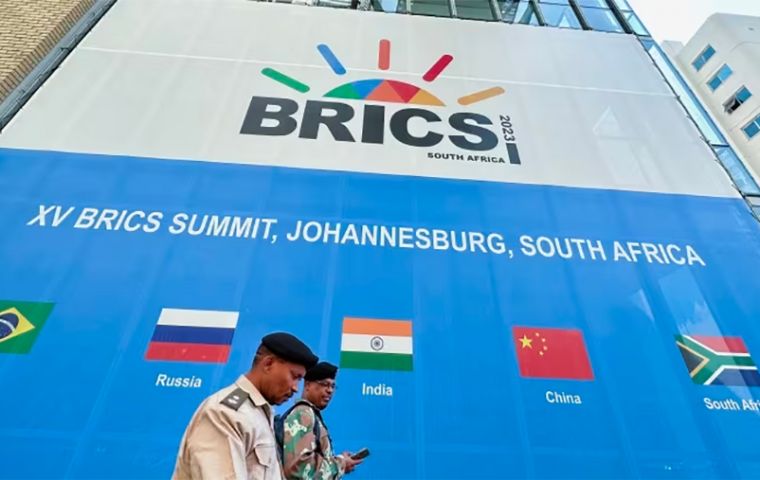MercoPress. South Atlantic News Agency
BRICS summit in South Africa has to decide on the access of new members
 The countries in the current BRICS grouping amount to 23% of the world's gross domestic product and represent 42% of the global population.
The countries in the current BRICS grouping amount to 23% of the world's gross domestic product and represent 42% of the global population. This week Johannesburg is hosting the 15th summit of the BRICS group (Brazil, Russia, India, China, and South Africa) when a historic decision is expected, reconfiguring the group with the access of new country members.
BRIC leaders are expected to agree on norms and procedures for such admissions, but there are dissenting voices, one of them Brazil which apparently is not that enthusiastic about in the expansion.
Apparently 23 countries have requested joining and another forty have shown an interest, and among the first, Saudi Arabia, Argentina, Egypt, United Arab Emirates and Indonesia. They are the strongest candidates and are also members of the G 20 and the New Development Bank, crated in 2014 by BRICS.
The final decisions on new members rests on the leaders of the group of five, based on expansion criteria, which should have been agreed in previous meetings. Officials from the delegations have been working out on access conditions and the final statement of the BRICS summit at Johannesburg.
Allegedly Brazil is not entirely convinced since it understands the access of new members could change the concept of the group and create a new BRICS, diluting the influence of the current five member organization and their geopolitical standing. The idea of expanding BRICS dates back to 2011 when South Africa was integrated, and since then hosts of the summits invite surrounding countries to create an interest and promote the group.
According to Brazilian diplomacy China, the largest economy of the group, is pushing strongly for expansion with an interest in outstanding Beijing in Asia, but it also sponsors anti US countries such as Iran, Cuba, Venezuela, in its global struggle with Washington, of which Brasilia believes a bit too provocative.
Russia and South Africa seem to follow China's approach, and India originally with Brazil is now closer to the others, in support of the United Arab Emirates. Apparently Brazil's Lula has been convinced of admitting the Saudis, UAE, Argentines and even Venezuela, which would represent a greater GDP, but Brazil also wants to safeguard the integrity and cohesion of the original BRICS. Plus underlining that an expanded group would turn decision making more cumbersome and heterogeneous.
Faced with this situation Brazil believes in creating new categories for incoming members, the aggregate countries could be categorized for example 'associates' or 'partners'. This apparently is what the five leaders are negotiating behind closed doors,
Besides Brazil is demanding that it is essential that old and new members must all support a reform of the United Nations system. This includes reforming the Security Council to make it global. This means including Brazil, India, South Africa.
Likewise Brazil wants new members of the expanded BRICS to be full partners of the Development Bank and the G20, on time for 2024, when Brasilia presides over the group and hosts the next summit. But, according to president Lula da Silva, Brazil will not lobby for the access of any country in particular, since decisions must be taken based on consensus.
Other issues in this week's agenda, according to Brazilian sources include creating a BRICS currency to replace the US dollar in international transactions and trade, plus promoting the currencies of member countries. This is extensive for the BRICS Development Bank.
Another point is the war in Ukraine which involves Russia. But opinions here are also divided since Brazil has condemned the Russian invasion as voted in the UN, and calls for peace, while all the other members, India, China and South Africa have so far abstained from any serious condemnation of Vladimir Putin, and asking for an end to the conflict.
The countries in the current BRICS grouping amount to 23% of the world's gross domestic product and represent 42% of the global population.




Top Comments
Disclaimer & comment rulesCommenting for this story is now closed.
If you have a Facebook account, become a fan and comment on our Facebook Page!